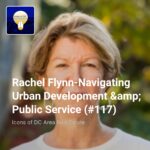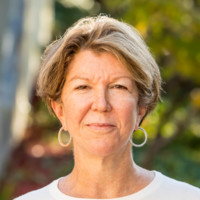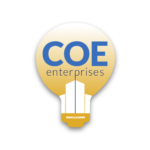

Bio
As of July 15, 2024, Rachel Flynn is the Deputy City Manager of Intentional Growth and Strategic Infrastructure for the City of Greeley, Colorado. She will support the city council’s plans for improving key areas such as water and sewer, economic development and urban revitalization.
Prior to moving to Greeley, CO, Rachel was the Deputy County Executive of Fairfax County, Virginia, responsible for public works, transportation, code compliance, and planning and development departments, along with the park authority from 2019 until her recent move.
Prior to Fairfax County, Rachel had two private sector positions. The most recent was as Director of Design Management, Planning and Entitlements for Google, in Mountain View, CA. She led several real estate planning initiatives there. Prior to Google, she worked on a large military base privatization effort in Concord, CA by Lennar, a large homebuilder she started with in 2016.
Prior to Lennar, she was the Planning Director for the City of Oakland, CA starting in 2013. Prior to Oakland, she was working for the Government of Abu Dhabi in the UAE to help in their planning efforts. Prior to the foray to the Middle East, Rachel led the Planning Departments of the City of Richmond, VA and the City of Lynchburg, VA. Prior to her career in government planning, she practiced as an architect in several urban markets.
She received her BA in Architecture from Catholic University in Washington, DC and subsequently, a Masters in Public Administration from the Harvard Kennedy School of Government.
Show
- Origins and Parental Influences (00:05:21)
- Rachel Flynn shares her upbringing, Irish Catholic family, and parental influences, including her father’s involvement in politics.
- Civil Rights Bill and Family Background (00:06:46)
- Rachel discusses her father’s role in the writing of the civil rights bill and the voting rights bill, as well as her mother’s background.
- Growing Up in a Different D.C. (00:08:58)
- Rachel recalls her experiences in a different Washington, D.C., during the antiwar movement, civil rights movement, and the city’s transformation.
- Interest in Architecture (00:10:09)
- Rachel explains how her interest in architecture developed, influenced by her father’s background and her experiences in music and architecture school.
- Living in Paris (00:12:30)
- Rachel recounts her experience living in Paris and how it influenced her appreciation for opera, art, and the architecture of the city.
- Professional Experience in Architecture (00:13:59)
- Rachel discusses her work as an architect in New York City, Boston, Toronto, and Tel Aviv, highlighting her diverse experiences in different cities and projects.
- Transition to Public Sector (00:17:25)
- Rachel explains her transition to the public sector, influenced by her education at the Kennedy School and her desire to have a broader impact on city development.
- Director of Planning and Community Development (00:19:38)
- Rachel reflects on her role as the director of planning and community development in Lynchburg, Virginia, and the challenges and opportunities it presented.
- Choosing Public Service Over Development (00:21:15)
- Rachel shares her decision to pursue public service over becoming a developer, driven by her love for public service and the desire to have a significant influence.
- Transformation of Lynchburg (00:23:09)
- Rachel discusses the transformation of Lynchburg, including the impact of a visit from Mayor Joe Riley and the importance of building cities for all individuals.
- Ninth Street Design and Implementation (00:24:40)
- Rachel shares her efforts to implement a downtown plan immediately and focus on the riverfront in Lynchburg.
- Evolution of Colleges in Lynchburg (00:26:54)
- Rachel discusses the transformation of colleges in Lynchburg, including the renaming of Randolph-Macon Women’s College.
- Influence of Outsiders and Jerry Falwell in Lynchburg (00:28:31)
- Rachel reflects on the influence of outsiders and the impact of Jerry Falwell on the city, including their interactions.
- Urban Development and Highway Ramp in Lynchburg (00:30:40)
- Rachel shares her experiences with urban development and negotiations with Jerry Falwell regarding a highway ramp in Lynchburg.
- Saving Sweet Briar College (00:31:43)
- Rachel discusses her involvement in saving Sweet Briar College from closure and the challenges faced in the process.
- Transition to Richmond and Riverfront Planning (00:32:58)
- Rachel talks about her transition to Richmond and her focus on riverfront planning, incorporating various elements into the downtown plan.
- Form-Based Code Implementation (00:37:14)
- Rachel explains the adoption of form-based code in Richmond and its impact on zoning and urban design.
- Reconnecting Neighborhoods in Richmond (00:38:50)
- Rachel discusses the efforts to reconnect neighborhoods in Richmond, focusing on Jackson Ward and the impact of highways on communities.
- Transition to Abu Dhabi and Living Conditions (00:40:22)
- Rachel shares her decision to move to Abu Dhabi and her experiences with the living conditions and lifestyle changes.
- Urban Planning Projects in Abu Dhabi (00:44:00)
- Rachel describes her work on urban planning projects in Abu Dhabi, including the development of Moruya Linear Park and the history of the UAE.
- Oil and Emirates (00:44:23)
- Discussion about the formation of emirates, oil, and natural gas distribution, and the influence of Iran.
- Urban Development in Abu Dhabi (00:47:18)
- The design and development of Abu Dhabi, including urban street design and infrastructure for the city.
- Living and Working in Abu Dhabi (00:49:00)
- Cultural and lifestyle aspects of living and working in Abu Dhabi, including language, population demographics, and social interactions.
- Alcohol and Lifestyle in Abu Dhabi (00:49:30)
- Regulations and cultural norms around alcohol consumption and socializing in Abu Dhabi.
- Transition to the U.S. (00:50:30)
- The decision to return to the U.S. and transitioning back to work in the public sector.
- Urban Development in Oakland (00:51:02)
- The focus on downtown development, housing construction, and the transformation of Oakland’s urban landscape.
- Challenges in California (00:53:06)
- Discussion about the challenges of development in California, including the California Environmental Quality Act (CEQA) and its impact on projects.
- Public and Private Sector Collaboration (00:54:09)
- The importance of understanding the needs and incentives of both public and private sectors in urban development.
- Tax Increment Financing (TIF) (00:55:24)
- The use and significance of Tax Increment Financing (TIF) for urban development projects.
- Influence of Development Films (00:57:26)
- Rachel reflects on how a film about urban development inspired her interest in public service.
- Comparison of Oakland and San Francisco (00:59:36)
- Comparing the development history and differences between Oakland and San Francisco, including their geographic and historical influences.
- Economic and Cultural History of Oakland (00:57:33)
- The economic and cultural history of Oakland, including the impact of the military and industrial developments.
- Transition to Private Sector (01:04:23)
- The decision to transition to the private sector and the opportunity to work with a major home builder in California.
- Concord Naval Weapons Station Project (01:06:44)
- Discussion about overseeing the redevelopment of the Concord Naval Weapons Station site, including the scale and complexity of the project.
- Master Planning and Development (01:07:00)
- The challenges and responsibilities of master planning and development for large-scale projects.
- Becoming a Google Executive (01:10:00)
- Rachel discusses her unexpected offer to become a Google executive and the company’s rapid growth in Silicon Valley.
- Google’s Expansion in San Jose (01:11:00)
- Details about Google’s plans to expand in San Jose, including building a new campus and the development of the Dearden Station area.
- Google’s History and Growth (01:13:10)
- A brief history of Google’s origins and its rapid expansion, including the acquisition of other companies and the design of its iconic structures.
- Leaving Google and Returning to Virginia (01:16:15)
- Rachel Flynn’s decision to leave Google and her husband’s potential run for office in response to the Charlottesville incident.
- Joining Fairfax County Government (01:17:00)
- Rachel Flynn’s decision to join Fairfax County as a deputy county executive and her responsibilities in various departments.
- Economic Initiatives and Resilient Fairfax (01:18:00)
- Details about the creation of the Economic Initiatives department and the Resilient Fairfax initiative to address climate action and resilience.
- Creating Economic Development Department (01:20:00)
- The process of creating the Economic Initiatives department and its role in supporting small businesses and the local economy.
- Fairfax County’s Demographics and Development (01:25:55)
- Insight into Fairfax County’s diverse population, its economic prosperity, and the challenges of transitioning to mixed-use development and transportation planning.
- Challenges in Shifting Transportation Focus (01:29:45)
- The challenges of transitioning from an auto-dominant county to more mixed-use development and transportation planning, including the focus on placemaking.
- Autonomous Vehicle Launch at Mosaic (01:31:30)
- The introduction of the first publicly owned autonomous vehicle in Virginia and its operation around the Mosaic district.
- Reston Town Center (01:33:20)
- Discussion about the success and development of Reston Town Center, including its design, public spaces, and blend of uses.
- Reston Station and Fairfax Corner (01:34:30)
- Conversations about the development challenges and successes at Reston Station and Fairfax Corner, focusing on design, public spaces, and mixed uses.
- Reston Station Boulevard (01:36:00)
- Exploration of the efforts to improve street design at Reston Station Boulevard, including discussions about bus lanes, retail, and traffic flow.
- Tysons Corner Development (01:39:50)
- Discussions about the development and urban planning in Tysons Corner, including the challenges of street design, transportation networks, and land use.
- Route 1 and Route 29 Development (01:40:00)
- Conversations about the planning and transportation improvements on major corridors like Route 1 and Route 29, including the focus on pedestrian-friendly designs and transit-oriented development.
- Fairfax County Transportation and Planning (01:48:00)
- Insights into the multifaceted role of overseeing transportation, planning, economic development, and public works in Fairfax County, with a focus on cooperation and implementing change.
- Planning Philosophy and Negotiating Fairness (01:50:30)
- Discussion of the planning philosophy, community engagement, and the challenge of negotiating fairness among various stakeholders in urban development.
- Shifting Behavior for Sustainable Urban Planning (01:52:00)
- Rachel discusses the need to change existing driving behavior to promote sustainable urban planning and reduce traffic congestion.
- Engaging Younger Generations in Urban Planning (01:54:00)
- Rachel talks about the emergence of a new group, “yes in my backyard” (YIMBY), and the involvement of younger people in public meetings and planning processes.
- Challenges and Opportunities in Housing and Zoning (01:56:30)
- The discussion covers the challenges related to housing crisis, zoning movements, and the impact of density on property values.
- Reshaping Transportation and Urban Planning (01:59:00)
- Rachel emphasizes the need for visionary leadership in transportation and urban planning, discussing the impact of transportation design on land use and job creation.
- Promoting Collaboration and Community Development (02:00:00)
- The conversation centers on the importance of respecting diverse viewpoints, engaging developers as partners, and promoting community-oriented housing initiatives.
- Educational Initiatives in Urban Planning (02:03:00)
- The focus is on the importance of educational programs like UrbanPlan and the Mayor’s Institute on City Design in shaping urban planning and engaging with future leaders.
- Introduction to Rachel’s Move (02:07:30)
- Rachel discusses her recent move to Greeley, Colorado, and her motivations for leaving Fairfax County.
- Career Reflection (02:08:00)
- Rachel evaluates her career at the five-year mark, considering new opportunities and her future plans.
- Greeley’s Growth (02:09:00)
- Rachel explains Greeley’s expected growth due to its water resources and planning, highlighting its appeal.
- Historical Context of Greeley (02:09:30)
- Rachel shares the historical background of Greeley, including its founding and early challenges.
- Engagement in Local Projects (02:11:00)
- Rachel expresses her desire to engage in local projects, contrasting her experiences in larger cities.
- Greeley’s Agricultural Landscape (02:13:00)
- Rachel discusses Greeley’s agricultural land and its potential for growth and development.
- Water Rights Discussion (02:14:00)
- Rachel mentions her learning about water rights, which are crucial for Greeley’s development.
- Geographical Insights (02:14:30)
- Rachel clarifies Greeley’s geographical position between Wyoming and Denver.
- Agricultural Challenges (02:13:45)
- Rachel talks about the challenges of agriculture in Greeley, including the rocky terrain.
- Literary References (02:15:15)
- Discussion of James Michener’s “Centennial,” relating to Colorado’s history and geography.
- Future Retirement Plans (02:16:00)
- Rachel shares her and her husband’s potential retirement plans and their connection to Fairfax.
- Greeley’s Economic Landscape (02:17:00)
- Rachel describes Greeley’s economic structure, highlighting agriculture and education.
- Food Production Insights (02:17:45)
- Rachel talks about Greeley’s significant food production, including meat and cheese industries.
- Environmental Considerations (02:19:00)
- Discussion on the environmental impact of agricultural practices in Greeley and Fairfax.
- Cultural Shift in Greeley (02:20:00)
- Rachel notes the cultural shift in Greeley from agriculture to healthcare and other industries.
- Gender and Career Challenges in Urban Planning (02:20:45)
- Rachel shares her experiences of facing gender-related challenges in her career and the importance of confidence and support for women in urban planning.
- Overcoming Challenges in Transportation Planning (02:25:30)
- The discussion highlights the challenges and successes in advocating for sustainable transportation planning and the changing perspectives of established entities.
- The broken formula (02:27:00)
- Rachel discusses a challenging project and the difficulties of suggesting changes due to funding concerns.
- Surprising opportunities (02:27:50)
- Rachel talks about unexpected career opportunities, including a Google executive position and acceptance to Harvard Kennedy School.
- Family values (02:28:35)
- Rachel shares about her close-knit, diverse, and politically aligned family, emphasizing the importance of family values instilled by her parents.
- Socially motivated work (02:30:30)
- Rachel discusses her husband’s work as a public defender and their shared commitment to social justice and giving back.
- Words of wisdom (02:32:11)
- Rachel reflects on the advice she would give her younger self, emphasizing the importance of confidence.
- A message for all (02:33:00)
- Rachel shares a message of unity and care for others, expressing the belief that respecting and supporting each other can positively impact the country.
